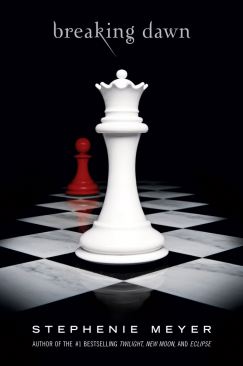Breaking Dawn

At some point, writing reviews of certain bestselling series seems like a superfluous endeavor. When thousands, if not millions, of readers are going to pick up the next installment regardless of its praiseworthiness or potential weaknesses, we reviewers feel even more irrelevant than we do otherwise. Penning reviews of the later Harry Potter books certainly felt like that. Stephenie Meyer's Twilight Saga, a publishing juggernaut soon to be made into a series of feature films, also, I would argue, has landed firmly in this category. I've reviewed all four novels for Teenreads.com, and I've watched as a series that started out as an unusual debut vampire romance took on a life of its own. So this review is, in all likelihood, completely unnecessary --- but since the review has the potential to live online nearly as long as the immortal Cullen family, here goes.
Bella Swan is ecstatic --- and nervous. She's on the brink of marrying the love of her life, the charismatic, devastatingly handsome vampire Edward Cullen. Bella's parents have reluctantly come around to the idea of their teenaged daughter getting married. And the Cullens, particularly Bella's good friend Alice, who plans the event, couldn't be happier. Only Bella's old pal Jacob is upset at losing Bella.
The wedding goes off smoothly and beautifully, and Edward and Bella spend a magical honeymoon on a private island. There, they are finally able to indulge the desire they've always felt for each other (even if their lovemaking initially results in injuries both to Bella and their room, thanks to Edward's uncontrollable passion). When Bella begins to be alternately sick and ravenous, she becomes suspicious that --- despite everything she's been told about the impossibility of such a thing --- she might be pregnant with Edward's child. Terrified that she could lose her life to the ravenous, vampiric unborn child inside her, pressured by Edward and others to rid herself of the baby, Bella retreats into herself, concerned only with protecting her unborn child, even if it means harm to herself.
As for Jacob (who narrates the middle part of the novel), he tries in vain to imprint on other females, but he cannot forget Bella, especially when he learns of her perilous pregnancy and physical condition. When Bella and Edward's daughter is born, is it possible that this half-human, half-vampire can unite the Cullens and Jacob's shape-shifting La Push clan? Could she be the catalyst for Jacob and Edward's reconciliation? Or does her very existence --- particularly once word of her birth reaches the dangerous Voltari vampire clan --- put everything Bella loves at risk?
It was perhaps inevitable that Stephenie Meyer would disappoint some with this final installment. Readers --- who have lined up for hours for author appearances, pushed the series onto bestseller lists, and created thriving online communities devoted to the book --- obviously take the novels, and these characters, seriously indeed. Certain elements of BREAKING DAWN are perplexing, even off-putting --- particularly the scenes of sex, pregnancy and childbirth.
But it's nearly impossible to please everyone --- especially when so much of the series' drama has relied on the tension of Bella's choice between two very different but desirable lovers. Readers who are able, eventually, to gain some perspective will find much to redeem BREAKING DAWN, particularly its new insights into Jacob's inner life as well as its neat resolution to several of the series' pressing conflicts and its realistic (or at least as realistic as a vampire romance can get) portrayal of the complexities and joys of married life.
Meyer's legions of fans are likely to debate, discuss and dissect BREAKING DAWN for months to come --- at least until the film version of TWILIGHT comes out on November 21st, when they'll have a whole new set of creative decisions to consider and critique.
